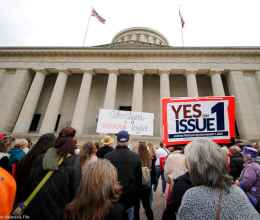The Ohio Court of Appeals for the Eighth Judicial District (Cuyahoga County) today vacated the sentence of Yuriko Kawaguchi. In October 1998, Kawaguchi was sentenced to six months in prison by Judge Patricia Cleary, for her role in a credit card scheme. Remarks made from the bench during the sentencing hearing, as well as irregularities in the way in which Kawaguchi was transferred to prison, suggest that her sentence was enhanced because she expressed the desire to terminate her pregnancy while incarcerated. The American Civil Liberties Union of Ohio Foundation took her case, appealing her sentence and filing an separate lawsuit against Judge Cleary and several other county employees, based on the claim that Cleary had attempted to coerce Kawaguchi into carrying her pregnancy to term.
The Court of Appeals decision handed down today deals only with the sentence imposed in October 1998. In a two-to-one split opinion, the Court of Appeals today held that Judge Cleary sentenced Kawaguchi without following the proper sentencing procedures required by Ohio law.
The Ohio revised Code (Section 2929.19) established the proper mechanism for sentencing those convicted of fifth degree felonies (the least serious sort). Ordinarily, these comparatively minor crimes result in the imposition of "community control sanctions," and not prison time. The law requires judges to consider a number of factors before imposing a prison term for minor felonies, and to formally list their reasons for imposing a prison term for minor felonies, rather than the less severe community control sanctions.
The Court of Appeals today held that Judge Cleary failed to follow the proper procedures in sentencing Kawaguchi, because she neither considered the many factors required by law, nor listed her reasons for choosing to sentence Kawaguchi to six months in prison.
The Court of Appeals did not reach the question of whether Judge Cleary had sentenced Kawaguchi as a means of forcing her to carry pregnancy to term, in violation of her constitutional rights. Ordinarily, a court will not reach constitutional question if it can overturn a case on statutory grounds, as happened here. The case now returns to the Court of Common Pleas for proper sentencing.
State Appeals Court Vacates Sentence of Pregnant Prisoner
Related Issues
Related content

Ohio Abortion Providers File Lawsuit Challenging 24-Hour Waiting...
March 29, 2024
Your Rights to Abortion Care in Ohio
January 16, 2024
Ohio Abortion Providers File Amended Complaint in Challenge to Six...
December 14, 2023
Holidays & Human Rights: What to Read, Watch, and Listen To
December 7, 2023
Ohioans Vote to Protect Reproductive Freedom in the Ohio State...
November 7, 2023
Battling for Reproductive Rights: Ohio's Religious Communities...
November 6, 2023
Ohio's Extreme Abortion Ban is One Ruling Away from Going into...
September 27, 2023
Despite revisions, Ohio Ballot Board again approves ‘biased’ ...
September 21, 2023
